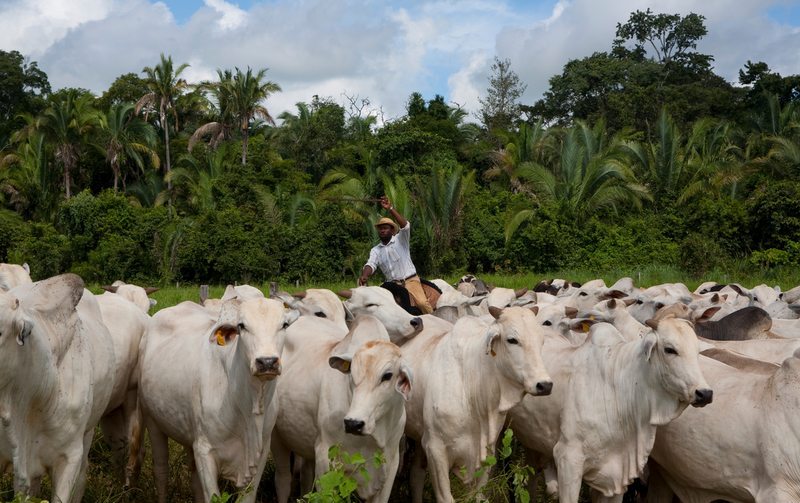While Unilever and Nestlé have made strides towards implementing no-deforestation policies, the vast majority of companies have not. Now some of the world’s biggest institutional investors are pushing for change through the Investor Initiative for Sustainable Forests, says Julie Nash of Ceres
As the cycle of forest fires burning through the Amazon has captured the world’s attention, institutional investors have seized the opportunity to shift the focus to some of the root causes of the problem: decades of poor forestry and land-use management and poorly managed agricultural supply chains.
Earlier this month, in the run-up to Climate Week New York, an unprecedented number of investors – 230 institutional investors representing $16.2trn in assets under management – issued an urgent plea to companies to take action against deforestation. Among the investors are some of the largest investment managers and asset-owners from around the globe, representing more than 30 countries.
“As investors who have a fiduciary duty to act in the best long-term interests of our beneficiaries, we recognise the crucial role that tropical forests play in tackling climate change, protecting biodiversity and ensuring ecosystem services,” the investors wrote in a public statement.
As investors, we have a responsibility to address these threats within our portfolios across the value chain
Major investors increasingly recognise that deforestation creates material financial risks for companies, including reputational and market risks. In addition, deforestation exacerbates systemic risk across portfolios by contributing to the global climate crisis. A recent Intergovernmental Panel on Climate Change report found that 11% of global greenhouse gas emissions are caused by poor forestry and land-use management, including commodity-driven deforestation. It also warned there is no way to limit average global temperature rise to 1.5C – and thus avoid catastrophe – without halting deforestation.
Although there are multiple, complex economic drivers of Amazonian deforestation, scientists have identified cattle-ranching and agriculture as the main contributors of this global challenge.
Furthermore, there have been advances in satellite monitoring and technology that tie deforestation to specific companies that source soy, beef and leather from Brazil. Many of the investors who have signed the statement are involved in a collaborative investor engagement initiative with global companies exposed directly or indirectly to soy and cattle from South America.

The Investor Initiative for Sustainable Forests (IISF), led by PRI and Ceres, aims to transform industry practices to eliminate deforestation from cattle and soy supply chains.
Clearly, informed investors now know that the profitability of many brand name companies who sell consumer goods and agricultural products depends on secure, legal access to a supply chain that is free of deforestation, and that the links between deforestation, land use changes, climate change, and the global economy are strong.
As Lauren Compere of Boston Common Asset Management explains: “As investors, we have a responsibility to address these threats within our portfolios across the value chain – from agricultural producers to the banks that finance them. We can address this through financial mechanisms and solutions that are in the best interests of our clients, the environment, and the communities we affect on the ground.”
Inaction on deforestation threatens portfolios and critical ecosystems, therefore companies must help put an end to deforestation
So the overall message from investors is clear: inaction on deforestation threatens portfolios and critical ecosystems, therefore companies must help put an end to deforestation. Here are three specific ways companies can take meaningful action:
• Enact commodity-specific no-deforestation policies – Sustainable sourcing policies that protect the forests must be front and centre. These policies must align not only with internal company social and environmental standards, but also with external environmental standards.
• Use effective monitoring and verification systems – Companies must demonstrate they can hold suppliers accountable and enforce no-deforestation policies. If a company finds deforestation in its supply chain, it needs to be prepared to implement its supplier non-compliance plan – one that either brings suppliers back into compliance or removes them from the supply chain.
• Be transparent in reporting progress on no-deforestation policies – Comparable and regular corporate disclosures allow investors to properly assess risks in their investments. Disclosure holds suppliers and companies accountable and allows for a greater understanding of how a company can meet its goals.
While some major companies, such as Unilever and Nestlé, have made strides towards implementing no-deforestation policies, the majority have not. As Ceres’ recent report found, nearly 500 global companies have committed to addressing deforestation, but few have effectively disclosed their progress on deforestation practices and commitments. Coming out of Climate Week, this inaction stands in stark opposition to the growing momentum from the business community and world leaders who increasingly recognise nature-based solutions as foundational mechanisms supporting economic prosperity.
Just last week, 19 global companies focused on agriculture and committed to biodiversity launched One Planet Business for Biodiversity, recognising the pressing need to reimagine the global food and agriculture system. Their goal: “Catalyse action to protect and restore cultivated and natural biodiversity within the value chains, engage institutional and financial decision-makers, and develop and promote policy recommendations in the CBD COP 15 framework to be held in 2020.”
Led by the World Business Council for Sustainable Development (WBCSD) and Emmanuel Faber, chairman and CEO of Danone, the coalition is the most recent signal that corporate and global wealth depends on healthy ecosystems. Never before have investors had a greater vested interest and opportunity to drive home the necessity to transform the global food and agriculture system, such as with the pressing and clear case for action on commodity-driven deforestation.
Therefore, as we move beyond climate week, companies should expect even more investor engagement on ending deforestation in the months ahead. It is time for companies to go beyond just making pledges and demonstrate clear progress on protecting the world’s forests.

Julie Nash PhD., is the director of food and forests at Ceres, a sustainability nonprofit organisation working with the most influential investors and companies to build leadership and drive solutions throughout the economy.

